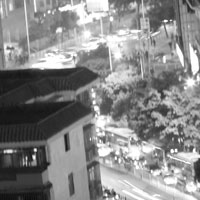
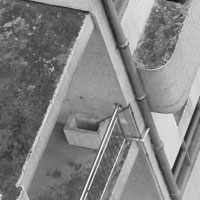






 |
 |
 |
 |
 |
 |
 |
 |
 |
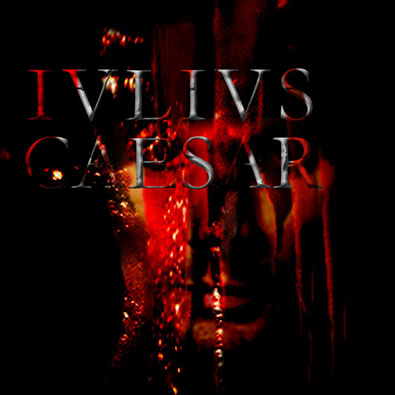 |
T H E R O M A N F O R U M T H E T R A G E D I E O F J U L I U S C A E S A R By Howard Hudson, december 2006 Prepare yourself for a surreal night. Find Largo Argentina, follow
a Backdrop Indeed, this is the focus of the production: things that play on the mind and the emotions. From myths to rituals to the semi-divinity of man: religion is the watchword.
Under this schema, corruption, sacrifice and purification Style The costumes and stage are spartan, all and sundry clothed in black.
Subtle green and purple scarves, and a single candle in the
|
|
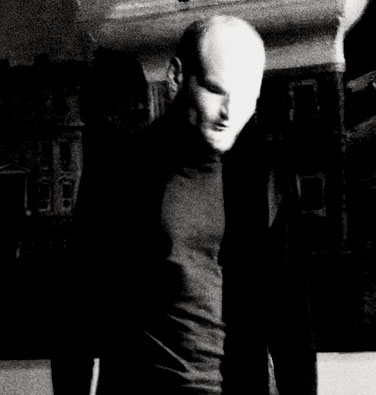 |
Cast The on-stage/off-stage device is also impressive – disturbingly so. Seated uniformly in the background yet still visible, characters that are meant to be ‘off-stage’ remain in sight, in suspended animation, adding to the supernatural undercurrents. This creates a sense of the collective unconscious while mirroring (and implicitly involving) the static audience. This effect is taken to its extreme when the corpse of Julius Caesar
is left in the middle of the stage for subsequent scenes. He later Fitzpatrick’s imposing figure also contrasts well with his sad, watery eyes, making him not only look the part but also more than able to draw pathos from the audience. It is impossible not to care what happens to this man. Gina Ferrarin, who variously plays the Soothsayer, Portia, Casca and
Messala also deserves a special mention. Her voice is William Mann, also the artistic director, gives an authoritative performance
as Marcus Brutus, exteriorising the internal conflicts of an ‘honourable’
defender of the Republic, as his raisons d’etre disintegrate. However,
in this openly minimalist production, Mann sometimes comes across as too
much of the consummate actor, at Conversely, other actors at times lack gravitas in key scenes, with excessive sneering and snarling detracting rather than adding weight and intensity. Overall, however, the production was powerful, poignant and original. |
||
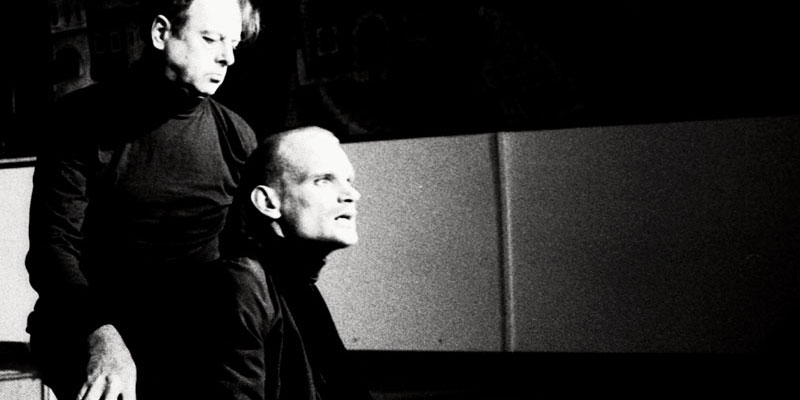 |
Interview with William Mann TRF: How did the company begin? WM: The idea was formed right here but I found the only way to start a theatre company in Rome was to leave Rome. There were just too many distractions. So I went back to Ireland, where my parents are based, to get some money together and come back here. In the meantime, my brother got married in Oslo, I went to the wedding,
met a girl. So I actually began in Oslo. I got involved with a theatre
company there, took that over, renamed it, rebranded it. We did lots of
Shakespeare, then we toured Ireland with our produc- Then I had the option of staying there to do Merchant of Venice, going
to Paris to do Macbeth or come to Rome to do Julius Caesar. And I chose
Rome. But next year I’ll be a judge for a competition in Paris,
the European Student Festival, so I have a lot of contacts there. The
plan is to go there in March and judge this competition and start something
running there. Have Julius Caesar always running here, Wednesday, Thursday,
Friday every week. Then start But it’s difficult to start things here. I came here in June expecting to be doing this in September and so it’s two months behind schedule. So if we go to Paris that could take another six months, which is frustrating. But the plan is to go there with Othello. So you’re constantly on the move? Yes, three years in Oslo, one in Ireland and here since June. When we
went to Ireland, we were based in a small town in Kerry. A Polish girl
– Patrycja Nowak – whom I worked with in Norway came over
as well because she’s a brilliant actress. But here it was a case
of getting people together, telling them to keep their jobs, starting
off semi-professionally. Eventually the income will hopefully mean we
can work less and less, so we can do more and more plays and Is this the first time that you’re trying to give the company a permanent base? Yes, ultimately Ireland wasn’t a good place for Shakespeare. People are more interested in local plays. But we can still tour as you always have the A-level and O-level students so any company can do Romeo and Juliet every year and have lots and lots of money just doing it for the students, schools and theatres. JC is a possibility for Ireland because some of them study it, though not many. But I have the contacts there and in Norway for touring and there are a lot of English speakers in Scandinavia – but neither has the tourist market that Rome has. We just reached the glass ceiling there. So is that your aim for Rome, to tap into the Anglophone tourist market? Expats, tourists, anyone is welcome. There are so many possibilities here: you have l’Estate Romana, Notte Bianca, and hopefully we can get involved with these. One of our actresses, Marzia Del Fabbro, owns her own recording studio so we are going to do an audio production. Set things up like that – put it on the website – make it international. Then have the Rome people go to Paris and to Ireland. Is that all fluid or is there a concrete plan? At the moment, the priority is establishing Rome. Paris, again, it’s the same thing: people who live there, who work in theatre but who don’t get an opportunity to perform Shakespeare in English. For example, I heard there was a production of My Fair Lady in Rome, where the local actresses had to pay to do it in English for the work experience. I’d also like to get into more workshops, movies, filming the productions. Trying to make it profitable so you can do more theatre. Then for the summer we aim to do lots of outdoor comedies, winter is more for the tragedies. |
||
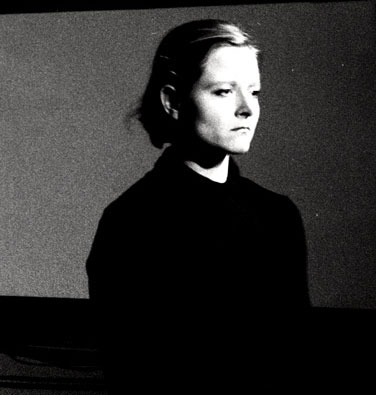 |
Have you sought backing from the City of Rome? We first have to register as a cultural association, then we can apply for funding. That would transform everything on the business side. It wouldn’t affect the production – costumes wouldn’t change. Well maybe we would buy Armani black polar necks but it would still be the same style. Stripped down, shown in a different way. Some people were expecting togas, and it just becomes ridiculous. The venue is nice, it has that subterranean feel about it, but we may move. The site of Pompey’s Curia between Largo Argentina and the river, to the west, is where Caesar was killed – and the site of the theatre. Did you choose this venue on purpose? It was a complete surprise to us but it is amazing, creepy. There’s also a statue of Pompey three or four doors down. Do you plan to perform at the replica of The Globe in Villa Borghese? We’d love to. People have been saying to us: ‘interesting but come back to us once you’ve got things going’. A few weeks, months, maybe after Christmas. If you build up your reputation you can start saying to people ‘we’re established, we’ve done this – here’s the poster, the flyer’, and they can see what you’ve done. So we’re working towards that right now. The Globe currently only performs Shakespeare in Italian. What do you think of foreign (language) productions? I’ve seen some terrible Italian and American productions, but perhaps it’s not their fault. The worst, most damaging thing anyone can say about Shakespeare is that ‘it’s so beautiful’ and they are describing it as being beautiful in the same way as my gran used to describe classical music as being beautiful – because it puts you to sleep.And they have this idea that beauty is a kind of narcotic. People don’t go to the Sistine Chapel and say ‘oh I need a good sleep now’. They go and say ‘Oh my God’, which is what great art should do, and what we’re trying to do.
|
||
|
||
| W I L L I A M M A N N | T H E A T R E c u r r e n t p r o d u c t i o n s p r e v i o u s p r o d u c t i o n s p r e s s d o w n l o a d s |
F I L M a n d d e a d a g a i n m a n ( 2 0 1 7 ) n a r k i s s o s ( 2 0 1 6 ) s h a k e s p e a r e ( 2 0 1 6 ) c h a m b e r s h a k e s p e a r e ( 2 0 0 8 ) |
||
P H O T O G R A P H Y
|
W R I T I N G
c a n t o s q u a t r a i n s p a i n t e r a n d h i s m o d e l t h e r e v e n g e r ' s t r a g e d i e u n d e r w o r l d r e x o c c i d e n s |
|||
© c o p y r i g h t 2 0 1 7 m a n n w i l l i a m . c o m a l l r i g h t s r e s e r v e d |